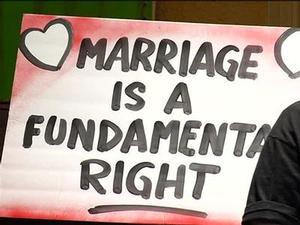 Hot debates today on the first day of the US Supreme Court’s arguments over same sex marriage. It doesn’t seem likely that the gay marriage ban in California will be overturned – I suspect the Court will throw out the case on technical grounds without making a decision. It’s not just the Supreme Court that’s having trouble “going into uncharted waters” (as one Justice put it today) but also American politicians. In recent days, a parade of Republican and (less surprisingly) Democratic politicians have pronounced themselves in favor of same-sex marriage. This of course comes after President Obama last year famously announced that his views are no longer “evolving” but that he is now in favor of marriage not just civil unions for gays and lesbians. It seems this is a moment when the tide has turned in the US on the issue, as is evident in recent surveys. The pattern seems to be similar in terms of immigration reform, with US politicians following popular sentiment that there should be a road to citizenship for undocumented immigrants. The movement towards inclusion and away from exclusion seems slow but relentless. Not everyone is on board at this point but the momentum seems clearly established. Of course it is that fact that is bringing politicians around — they tend to like winning elections — rather than any new insights into social justice and equality.
Hot debates today on the first day of the US Supreme Court’s arguments over same sex marriage. It doesn’t seem likely that the gay marriage ban in California will be overturned – I suspect the Court will throw out the case on technical grounds without making a decision. It’s not just the Supreme Court that’s having trouble “going into uncharted waters” (as one Justice put it today) but also American politicians. In recent days, a parade of Republican and (less surprisingly) Democratic politicians have pronounced themselves in favor of same-sex marriage. This of course comes after President Obama last year famously announced that his views are no longer “evolving” but that he is now in favor of marriage not just civil unions for gays and lesbians. It seems this is a moment when the tide has turned in the US on the issue, as is evident in recent surveys. The pattern seems to be similar in terms of immigration reform, with US politicians following popular sentiment that there should be a road to citizenship for undocumented immigrants. The movement towards inclusion and away from exclusion seems slow but relentless. Not everyone is on board at this point but the momentum seems clearly established. Of course it is that fact that is bringing politicians around — they tend to like winning elections — rather than any new insights into social justice and equality.
It’s not just the US that has been debating same-sex marriage. Two days ago hundreds of thousands protested in Paris against the proposed law legalizing same-sex marriage in France. Recent surveys indicate that the protesters are trying to swim upstream, as the majority indicate support for the new law, although there are reservations about adoption by same-sex couples. In France too the momentum has been helped by the support of President François Hollande. The importance of leadership in this area points to how vital it is for future leaders to learn the lessons of open-mindedness towards difference that intercultural communication theory strives to impart.